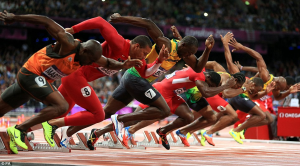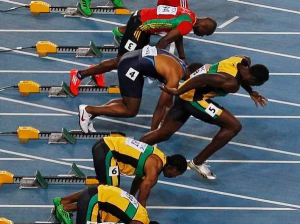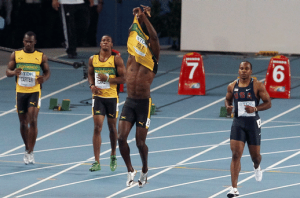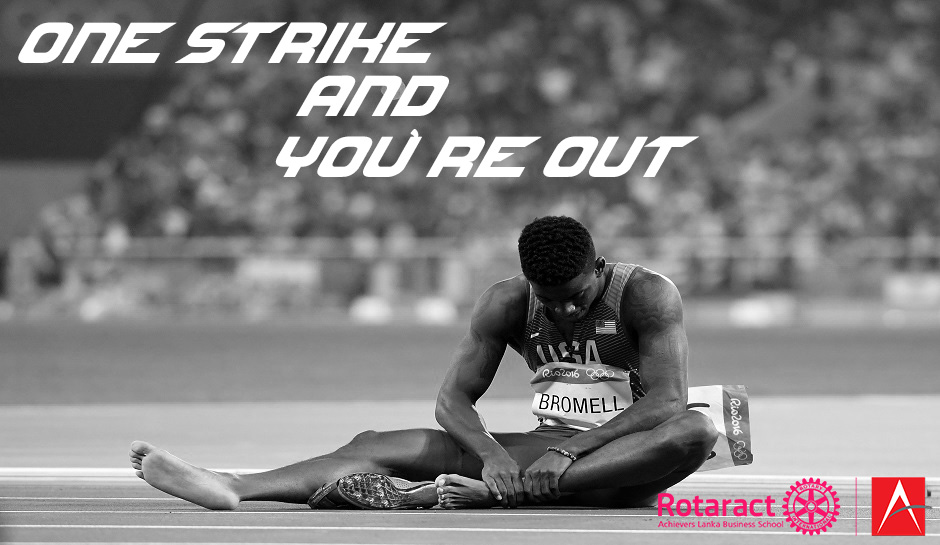“If you want to know the value of a millisecond, ask the athlete who won a silver medal at the Olympics or, the athlete whose race ended before it began”
It is only the best of the best who have lived the moment of standing before the finals of the Olympic Games. You and I can only imagine what it feels like. Being under like lights of that field of the Olympic final with a crowd of over 70,000 spectators glancing down at you, eagerly waiting to see who will next hold the title of “The fastest Man on Earth.” Having your proud nation wait breathlessly until you raise the county’s flag, and another globe full watching you through television screens. You’re less than ten seconds away from your victory after the shot of the gun. This moment should feel very special indeed and it has taken these athletes four years of waiting and a lifetime of hard work.
 After coming thus far, does it seem possible to believe that you could still mess up? That a matter of a fraction of a second could blow out everything? That you could relegate from an Olympic Finalist to a mere spectator watching your fellow competitors chase the goal without you? Yes, it seems a little too harsh, but so are the rules folks.
After coming thus far, does it seem possible to believe that you could still mess up? That a matter of a fraction of a second could blow out everything? That you could relegate from an Olympic Finalist to a mere spectator watching your fellow competitors chase the goal without you? Yes, it seems a little too harsh, but so are the rules folks.
In 2010, the IAAF tightened rules for sprinters introducing the zero tolerance rule for false starts. Alternatively referred to as the One-strike-and-you’re-out rule, this would result in immediate disqualification of the athlete in the case of a false start with no warnings or do-overs. This rules was believed to be the cruelest one yet, in all of sports.
However, the IAAS did not make this decision over night. There were a couple of rule changes regarding this matter over the years and various issues arising from them. Therefore after careful consideration, the IAAF have settled to the zero tolerance rule. The rule was officially announced in 2010 after passing 64% approval.
The rules that existed before were quite flexible. Initially sprinters were only disqualified after their second false start. This seemed quite fair towards the runners, although some athletes still let their chance slip. Linford Christie of Great Britain was amongst them when he was dismissed before having the chance to defend his title at the 1996 Olympics. Anyhow, we can all agree that if you false start twice in a single race, that you’ve had your chance.
Later the IAAF identified a few drawbacks of this rule. They believed that it gave the athletes the chance to guess when the gun sounded and gain advantage. Also, having to start races many a times used up a lot of time, especially on television and the events could not be kept to their time slots. This would have also affected the quality of international games. Therefore the IAAF brought in a rule change in 2003.
In 2003 the rules were revised so that only one false start was allowed per race. If one runner false started, the entire field was warned. The next runner to false start would be dismissed regardless of if it was the first one or not. But later it was noticed that relatively slower athletes deliberately jumped the gun the first time to add pressure to the ones who are generally faster out of the blocks. Runners started to mentally affect their opponents as well as not receive punishment for false starting. This was considered unfair even within the rules. Hence, the IAAF saw the need for yet another rule change.
There came the one-and-do rule in 2010; the cruelest of all time. A single false start, or for that matter, the barest of a flinch would result in the dismissal of the athlete. Not even the slightest twitch was allowed.
Imagine finally having your Olympic moment, you’re on the starting blocks, and you scratch you nose and that’s it? You just let your victory slide through your fingertips before you been knew it. Certainly this rule crushed the dreams of many Athletes, and was no exception even to the big man; Usain Bolt.


Bolt, also known as “The fastest man on Earth” was ironically one of the few who applauded the zero tolerance rule. He simply couldn’t believe himself when he false started in Daegu at the 2011 world championships leaving the crowd startled. It was heart breaking to watch this man walk out of the fields of the 100m final leaving behind the victory that was destined to him.
He was not alone. British 400m sprinter Christine Ohuruogu was also disqualified at the same championship after false starting at her preliminary heat. She was the gold medalist at the 2008 Beijing Olympics.
However, this championship gave a point for the IAAF to prove, resulting in only ten false starts overall under the new rule. This was less than half the number recorded in previous meets under older rules.
Anyhow since many believed that this rule was impractical, the definition of a false start was changed prior to the 2012 Olympics making things a little more flexible. Flinching and twitching was allowed and an athlete would only have a false start called against them if their hands left the ground or their feet the blocks, before the gun. This change resulted in no false starts being recorded at the 2012 Olympics, allowing this rule to settle.
At the 2016 Olympics the 21 year old French hurdler Wilhem Belocian broke the audience’s hearts as he jumped the gun at his 110m hurdles preliminary heat. It was his first time at the Olympics and his Olympic dream ended before it even began. It’s within the rules now and he had to go, but I can’t help feeling bad for this guy.
Does this all seem fair? That one moment could be the difference between everlasting glory and being forgotten forever. Well, it’s awful to accept but that seems the case folks. If you’re at the Olympics games, maybe there ain’t no time for mistakes.
Rtr. Kalani Siriwardena
